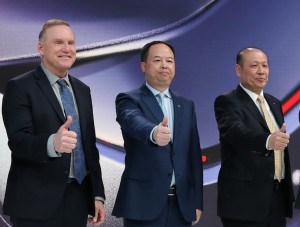
GAC Motor President Yu Jun (center) says the company will be ready to enter the U.S. market in 2020. That entry time has been delayed again to later in the year.
Chinese automaker Guangzhou Automobile Group has once again delayed its entry into the U.S. market due to President Donald Trump’s implementation of tariffs as well as the man himself.
During the North American International Auto Show in Detroit in January, GAC officials said they were pushing back their timetable to sell vehicles in America, looking to begin now sometime in early 2020 rather than late 2019.
However, GAC Chairman Zeng Qinghong told reporters at China’s annual parliament meeting in Beijing Friday that it would be even longer now, not establishing a time frame. He mentioned the uncertainty surrounding tariffs – discussions between the U.S. and China are ongoing – but also something personally tied to the president: his last name, sort of.
Potential dealers in the U.S. want the company to change the name of its brand: Trumpchi. The brand name is well known in China, but for obvious reasons, is seen as problematic in the U.S.
(Chinese automaker Zoyte planning to sell vehicles in U.S. by 2020. Click Here for the story.)
Initially, the delay revealed in Detroit in January was blamed on tariffs too, but in an interview with TheDetroitBureau.com, GAC Motor President Yu Jun also noted the company’s vehicles had not yet met U.S. specs for vehicles imported into the country, such as crashworthiness, emissions, etc. He said the company was working with regulatory agencies to resolve problems, but did not specify what those were.
GAC has been pushing to be the first Chinese automaker to import and sell vehicles in the U.S. under its own brand name; however, after this now third delay, other Chinese companies will have a chance to get here first.
(Click Here for more about Chinese automakers eyeing international roles.)
However, in terms of an actual Chinese vehicle being sold – not a Chinese brand – in the U.S. both General Motors and Volvo have beaten the rest of the pack to the punch. GM’s Buick Envision is made by SAIC in the Shandong province and shipped to the U.S.
Volvo in the meantime produces its S60 in China and ships those to the U.S. It had planned to build the XC60 in China too and send those to the U.S. However, with tariffs still under discussion, Volvo elected to move production to Sweden.
(For more about GAC’s plans to be first to sell a Chinese-branded vehicle in the U.S., Click Here.)
However, other Chinese automakers are still in the hunt to beat GAC to the punch, including Zotye Automotive, which has lined up 19 dealers to push the company’s first product: an SUV. In addition, BYD, which is owned in part by Berkshire Hathaway’s Warren Buffett, has been claiming it would be setting up a full-service operation for years.
